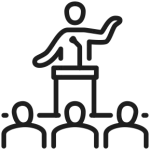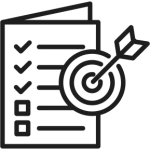NLP is a study that focuses on Human Excellence
It provides various tools, techniques, principles, mental models, and methods that function as success formulas, which anyone can apply to produce successful results in all areas of their life, whether personal, professional, emotional, relational, financial, or spiritual.
Co-Creators of NLP
NLP is an internationally standardized curriculum designed for
every person from any profession to create excellence in their lives.

Richard Bandler

John Grinder
NLP works for:


Leadership

Communication

Negotiation

Productivity

Profiling

Public Speaking

Sales

Teambuilding

Business

Anxiety & Stress

Bad Habits

Behavioral Issues

Depression

Phobias

Weight Loss

Personal Dev.

Self-Confidence

Relationships

Sports

Mindfulness

Goal Setting

Emotional Freedom

Financial Growth
Training Schedule
Online NLP Practitioner Certification Course
Virtual
Duration: 20 Days
60 hrs.
(actual training hours excluding breaks)
Venue: Online
30th Sept. to 7th Nov. 2024
(Mondays – Thursdays)
Timings: 07.30 pm – 10.15 pm (IST)
Investment: ₹ 36,000
Early Bird Offer: ₹ 32,000
Duration: 20 Days
60 hrs.
(actual training hours excluding breaks)
Venue: Online
6th Jan. to 6th Feb. 2025
(Mondays – Thursdays)
Timings: 07.30 pm – 10.15 pm (IST)
Investment: ₹ 36,000
Early Bird Offer: ₹ 32,000
Live Classroom
Duration: 6 Full Days
29, 30 Nov., 1 Dec, 6, 7, 8 Dec. 2024
(Fridays, Saturdays & Sundays)
Timings: 09.30pm – 06.00pm (IST)
Venue: Hotel Royal Orchid Central, Kalyani Nagar, Pune
Investment: ₹ 50,000
Early Bird Offer: ₹ 45,000
Breakfast, Tea / Coffee and Lunch
Duration: 6 Full Days
24, 25, 26, 27, 28, 29 Dec. 2024
Timings: 09.30pm – 06.00pm (IST)
Venue: 4D’S Coast Resort, Goa
Investment: ₹ 55,000
Early Bird Offer: ₹ 50,000
- Inclusive of Accommodation
- Breakfast, Tea / Coffee and Lunch
NLP Practitioner Certification Course
Why should you do NLP with us?

3 One-on-one personal coaching to contextualize NLP concepts & techniques to your goals/professiono

Get international certification from the American Board of NLP. It’s one of the biggest and oldest global NLP accreditation bodies.

Gain from 13 years of rich NLP facilitation experience.

Access course material and recorded demos of all NLP techniques in your Learning Management System (LMS)

Immerse yourself in movie-based learning with in-depth analysis through the lens of NLP

3 one-on-one coaching sessions to tailor NLP concepts & techniques to your goals or profession

Access self-hypnosis audio scripts to engrave NLP learnings in your unconscious mind

Opportunity to repeat the course once at no cost

Establish a solid theoretical foundation for enhanced application of NLP tools and techniques.

Engage in post-training implementation sessions to review and strengthen your understandings of NLP

Undergo personality assessment for an in-depth analysis of your personality type.

Start your NLP journey today with pre-course training modules.

Trusted by global brands.
Video Podcast: What is NLP?

NEURO
LINGUISTIC
PROGRAMMING
What are the Prime Benefits of NLP?


You'll develop an ability to apply NLP as a ready formula for every situation in life, be it physical, mental, social, emotional, financial, or spiritual

NLP sharpens your thinking for greater productivity and performance.

Boost your listening, understanding, questioning, and communication skills through NLP's Reframing and Chunking techniques

Expertly persuade, convince, influence, inspire, motivate, train, and coach others

Embrace NLP for living in the present moments. It's a simplified & scientific agent for spiritual development.

Master the art of conversational hypnosis to captivate your audience

Wealth isn't just about thoughts; it's about behaviors. NLP empowers you to develop the behaviors necessary for achieving your goals.

Acquire the skill to recognize individual language patterns for tailored interactions and results.

Uncover the strategies and mindsets of successful people to cultivate a success mindset
Application of NLP Practitioner Course in HR Functions

Effective Communication:
By using NLP techniques, HR professionals can become better at listening, asking questions, and conveying information, resulting in clearer and more effective communication with employees, managers, and other stakeholders.
Conflict Resolution:
NLP helps to understand different perspectives, manage, emotions, and find effective solutions to disputes. Since the prime approach of NLP is to recognize unique personality differences among individuals, resolving conflicts becomes a seamless experience. This can reduce conflict in the workplace and create a more harmonious work environment.
Recruitment and Retention:
By understanding candidates’ communication styles and behaviors, HR professionals can more effectively identify the best fit for the organization and develop optimum strategies to retain top talent.
Leadership Development:
NLP can help HR professionals develop leadership skills among employees. By coaching employees on communication, empathy, and self-awareness, HR professionals can help them develop into effective leaders, which can contribute to the success of the organization.
Employee Engagement:
NLP can be used to improve employee engagement, which is critical for retention and productivity. By understanding employees’ motivations, values, meta-programs, temperament, and communication styles, HR professionals can develop strategies to enhance engagement, resulting in a more positive work environment and improved business outcomes.
Job Description Writing:
NLP can be used to write job descriptions that appeal to a specific audience. By using language patterns that match the communication style of the ideal candidate, recruiters can attract more suitable applicants.
Candidate Sourcing: NLP techniques can be used to analyze job postings and candidate resumes to identify top candidates. This can help recruiters to quickly sift through large volumes of resumes and identify the most promising candidates.
Interviewing:
NLP can be used to improve the effectiveness of interviews by helping interviewers to establish rapport, build trust and get the most out of the conversation. For example, techniques such as mirroring, pacing and leading can be used to create a more comfortable and engaging atmosphere. Identification and suitability of the candidate can be recognized with ease and with less effort, resulting in an efficient method of the interviewing process.
Candidate Selection:
NLP can be used to analyze a candidate’s communication style, personality traits and behaviors to determine their suitability for a particular role. This can help recruiters to identify candidates who are a good fit for the organization’s culture and values.
Onboarding:
NLP can be used to help new hires to acclimate to their new role and work environment. For example, NLP techniques such as anchoring, Milton Model and reframing can be used to help employees feel more comfortable and confident in their new role.
Overall, NLP can be a valuable tool in talent acquisition, helping recruiters to attract, select and retain top talent. However, it’s important to use these techniques ethically and responsibly, with a focus on building positive relationships with candidates and creating a fair and inclusive hiring process.
Creating Engaging Learning Content:
NLP techniques can be used to create engaging and effective learning content. For example, using language patterns that match the communication style of the learner can help to improve their engagement and retention of the content.
Building Rapport with Learners:
NLP techniques such as mirroring and matching can be used to build rapport with learners, which can help to create a more positive and supportive learning environment. This can also help to improve communication and understanding between the trainer and the learner.
Improving Communication Skills:
NLP can be used to improve communication skills, such as active listening, questioning, and feedback. For example, techniques such as reframing and chunking can be used to help learners better understand complex information and communicate more effectively.
Developing Emotional Intelligence:
NLP can be used to help learners develop emotional intelligence, which is an important skill for effective leadership and teamwork. Techniques such as anchoring and visualization can be used to help learners develop greater self-awareness and emotional control.
Motivating Learners:
NLP can be used to help learners overcome limiting beliefs and develop a more positive mindset. Techniques such as positive framing and anchoring can be used to help learners set and achieve goals, and to maintain motivation throughout the learning process.
Overall, NLP can be a valuable tool for learning and development professionals, helping them to create more engaging and effective learning experiences, and to support learners in achieving their goals.
Developing Job Descriptions: HR professionals can use NLP techniques to write job descriptions that appeal to potential candidates. By using language patterns that match the communication style of the ideal candidate, HR professionals can attract more suitable applicants.
Improving Communication:
HR professionals can use NLP techniques to improve communication between managers and employees. Techniques such as mirroring and matching can help managers to understand their employees’ communication styles and tailor their approach accordingly, leading to better relationships and more effective communication.
Motivating Employees:
HR professionals can use NLP to help employees overcome limiting beliefs and develop a more positive mindset. Especially after elicitation of the Values Hierarchy, providing the right communication approach can elevate the motivation level of the employees.
Building Rapport:
HR professionals can use NLP techniques such as pacing and leading to build rapport with employees. This can help to create a more positive and supportive work environment and improve employee engagement.
Enhancing Training and Development:
HR professionals can use NLP techniques to improve training and development programs. Techniques such as positive framing and anchoring can be used to help employees retain information and apply new skills effectively.
Developing Job Descriptions:
HR professionals can use NLP techniques to write job descriptions that match the communication style and thinking patterns of ideal candidates. This can help to attract and hire candidates who are a better fit for the job.
Conducting Interviews:
HR professionals can use NLP techniques to conduct effective interviews. For example, techniques such as mirroring and matching can help to build rapport with candidates and improve communication during the interview process.
Identifying High-Potential Employees:
HR professionals can use NLP to identify high-potential employees by analyzing their communication patterns and thinking styles. This can help to develop talent pipelines and succession plans for key positions within the organization.
Enhancing Leadership Development:
NLP can be used to enhance leadership development programs. For example, techniques such as modeling and reframing can be used to help leaders develop effective communication and leadership skills.
Improving Performance Management:
HR professionals can use NLP techniques to improve performance management. Techniques such as positive framing, meta-model, Milton model, metaphors, and representational systems predicates can be used to help employees set and achieve goals, and to maintain motivation and engagement throughout the performance cycle.
Understand the employee’s communication style:
By using NLP techniques, HR professionals can identify an employee’s communication style and adapt their communication to suit that style. This can lead to better communication, improved understanding, and ultimately, improved compensation and benefits packages that meet the employee’s needs.
Use language that resonates with employees:
NLP techniques can help HR professionals use language that resonates with employees, thereby increasing their motivation and engagement. For example, using words that appeal to an employee’s sense of purpose or that align with their personal values can be more effective than simply discussing salary or benefits.
Identify and address limiting beliefs:
HR professionals can use NLP to identify and address any limiting beliefs that employees may have about compensation and benefits. By helping employees overcome these beliefs, HR professionals can increase their satisfaction and engagement with their compensation and benefits packages.
Use visual aids:
Visual aids such as charts and graphs can be used to help employees understand their compensation and benefits packages more easily. NLP techniques can help HR professionals design these aids in a way that is most effective for the employee.
Focus on outcomes:
By using NLP techniques, HR professionals can focus on the outcomes that employees desire from their compensation and benefits packages. This can help to create packages that are tailored to the specific needs of the employee and that provide the outcomes they are looking for.
Overall, NLP can be a useful tool for HR professionals to improve communication and understanding between employees and management, leading to better compensation and benefits packages that meet the needs and desires of the employees.
Neuro Linguistic Programming (NLP) can be a useful tool for HR professionals in managing employee performance by helping to improve communication, motivation, and understanding between employees and management. Here are some ways in which HR professionals can apply NLP in performance management:
Identify and address limiting beliefs:
NLP techniques can help HR professionals to identify and address any limiting beliefs that employees may have about their ability to perform. By helping employees to overcome these beliefs, HR professionals can increase their confidence and motivation, leading to better performance.
Use language that motivates and inspires:
By using language that is positive and inspiring, HR professionals can help to motivate employees to perform at their best. This can include using words that appeal to an employee’s sense of purpose, or that highlight the benefits and rewards of good performance.
Understand and adapt to the employee’s communication style:
By using NLP techniques, HR professionals can identify an employee’s communication style and adapt their communication to suit that style. This can lead to better communication, improved understanding, and ultimately, improved performance.
Set clear and achievable goals:
NLP can help HR professionals to set clear and achievable goals for employees, using language and visual aids that make these goals easier to understand and more motivating to achieve.
Provide feedback in a way that is constructive and supportive:
NLP techniques can be used to provide feedback in a way that is constructive and supportive, rather than critical or negative. This can help employees to feel more motivated and engaged, leading to better performance.
Use visualization techniques:
Visualization techniques can be used to help employees visualize themselves performing at their best. This can increase motivation and confidence, leading to better performance.
Overall, NLP can be a valuable tool for HR professionals in performance management by improving communication, motivation, and understanding between employees and management. By using NLP techniques, HR professionals can create a more positive and supportive work environment that fosters better performance and employee engagement.
Neuro Linguistic Programming (NLP) can be a valuable tool for HR professionals in promoting diversity and inclusion in the workplace. Here are some ways in which HR professionals can use NLP to foster a more diverse and inclusive workplace:
Understand and appreciate different communication styles:
By using NLP techniques, HR professionals can better understand the different communication styles of employees from different cultural backgrounds. This can help to reduce miscommunication and misunderstandings, and create a more inclusive work environment.
Use language that is inclusive and respectful:
HR professionals can use NLP techniques to ensure that their language is inclusive and respectful of all employees, regardless of their background. This includes avoiding language that may be offensive or exclusionary, and using words and phrases that are inclusive and welcoming.
Address unconscious biases:
NLP techniques can be used to identify and address unconscious biases that may be present in the workplace. By recognizing and addressing these biases, HR professionals can create a more inclusive work environment that values diversity and promotes equality.
Use visualization techniques:
Visualization techniques can be used to help employees visualize a more diverse and inclusive workplace. This can help to increase motivation and commitment to diversity and inclusion initiatives.
Create a culture of respect and openness:
HR professionals can use NLP techniques to foster a culture of respect and openness in the workplace. This includes encouraging employees to share their experiences and perspectives, and promoting open communication and collaboration across different teams and departments.
Overall, NLP can be a useful tool for HR professionals in promoting diversity and inclusion in the workplace. By using NLP techniques, HR professionals can create a more positive and supportive work environment that values diversity and promotes equality.
Improved Teaching Skills:
NLP trainers can apply NLP techniques to improve their teaching skills, including the ability to communicate effectively, understand different learning styles, and motivate learners.
Enhanced Coaching Skills:
With techniques such as Rapport Building, Meta-Model, Perceptual Position, and Strategies, NLP can greatly help HR professionals develop their coaching skills, including active listening, right questioning, and empathy. By understanding the needs and goals of the employees, HR professionals can use NLP to help them achieve their desired outcomes.
Greater Flexibility:
NLP provides trainers with a range of techniques and approaches, which can be customized to meet the needs of different clients and situations. This flexibility allows HR professionals to adapt their approach to different learning styles and preferences.
Improved Personal Development:
NLP techniques can be used for personal development, helping HR professionals overcome limiting beliefs, manage emotions, develop greater self-awareness, install success strategies, enhance confidence, and release emotions of fear and other negative attributes.
Business Growth:
By using NLP techniques, trainers can enhance their business skills, such as marketing, sales, and client management. This can help trainers grow their business and attract more clients.
Overall, NLP can provide trainers with the tools and techniques they need to become more effective in their role, whether that’s teaching, coaching, or running a business. NLP can enhance communication, understanding, flexibility, personal growth, and business growth.
Improved Communication:
NLP can help coaches improve their communication skills, which is essential for building rapport and understanding with clients. By using NLP techniques, coaches can become better at listening, asking questions, and conveying information, resulting in clearer and more effective communication with clients.
Enhanced Coaching Skills:
NLP can help coaches develop their coaching skills, including active listening, questioning, and empathy. By understanding the needs and goals of their clients, coaches can use NLP to help them achieve their desired outcomes.
Increased Flexibility:
NLP provides coaches with a range of techniques and approaches, which can be customized to meet the needs of different clients and situations. This flexibility allows coaches to adapt their approach to different learning styles and preferences.
Improved Personal Development:
NLP techniques can be used for personal development, helping coaches overcome limiting beliefs, manage emotions, and develop greater self-awareness. This personal growth can enhance the coach’s ability to connect with and understand their clients.
Better Client Outcomes:
By using NLP techniques, coaches can help their clients achieve their desired outcomes more quickly and effectively. NLP can be used to help clients overcome limiting beliefs, manage emotions, and develop effective strategies for achieving their goals.
Overall, NLP can provide coaches with the tools and techniques they need to become more effective in their role, whether that’s coaching individuals or teams. NLP can enhance communication, understanding, flexibility, personal growth, and better client outcomes.
Neuro-Linguistic Programming (NLP) is a technique that helps individuals understand how their thoughts, feelings, and behaviors are connected and how they can use this understanding to achieve their goals. As a mentor, using NLP techniques can provide several benefits, including:
Effective communication:
NLP techniques can help mentors to communicate more effectively with their mentees. By understanding how to use language to influence the mentee’s thinking and behavior, the mentor can communicate in a way that is more easily understood and absorbed by the mentee.
Building rapport:
NLP techniques can help mentors build rapport with their mentees. By using techniques such as mirroring and matching, mentors can create a connection with their mentee that can foster trust and understanding.
Goal setting:
NLP techniques can help mentors and mentees to set goals that are specific, achievable, and realistic. By using visualization techniques, mentors can help their mentees to see themselves achieving their goals, which can increase their motivation and focus.
Overcoming limiting beliefs:
NLP techniques can help mentors to identify and overcome limiting beliefs that may be holding their mentees back. By using techniques such as reframing and anchoring, mentors can help their mentees to change their mindset and achieve their full potential.
Developing self-awareness:
NLP techniques can help mentors to develop self-awareness in themselves and their mentees. By understanding how their thoughts and behaviors are connected, mentors can identify areas where they can improve and help their mentees to do the same.
Overall, NLP techniques can be a valuable tool for mentors, helping them to communicate effectively, build rapport, set goals, overcome limiting beliefs, and develop self-awareness in themselves and their mentees.
NLP Practitioner Course Content

Course Content 1
- Definitions of NLP
- NLP Communication Model
- Generative Success
- The Three Principles of NLP
- Neurological levels
- The Presuppositions of NLP
- Goal Setting
- Wheel of Life
- 4 Pillars of NLP
- Sensory Acuity
- Observing Other People
- Rapport
- Representational Systems & Assessment
- Eye Accessing Cues
- NLP Linguistic Model
- The Conscious Use of Language
- Linguistic Presuppositions
Course Content 2
- Hierarchy of Ideas
- Intonation Patterns
- Milton Model
- Meta Model
- The Agreement Frame
- The NLP Negotiation Model
- The Art of Metaphor
- Creating Metaphors
- Sub-Modalities
- Like to Dislike Script
- Beliefs Change Scripts
- Swish pattern
- Fast Phobia Cure
- Anchoring
- Circle of Excellence
- Collapse Anchors
- Change Personal history
- Chaining Anchors
- Strategies
Course Content 3
- T.O.T.E. Model of Strategies
- Elements of Strategies
- Buying Strategies
- Relationship Strategies
- Spelling Strategies
- Problem Strategies
- Reframing
- Parts Integration
- Parts Integration Script
- Perceptual Positions
- NLP in Sales
- NLP in Management
- NLP in Education
- NLP in Therapy
- NLP in Relationships
- NLP in Negotiating
- NLP in Meetings
- Time Empowering Techniques
Who will be your trainer?


Ravi Bodani
NLP Trainer | NLP Coach | NLP Master Practitioner
Gallup Certified Coach | Certified Accelerated Learning Professional | Certified Hypnotherapist
Contributors of NLP


Alfred Korzybski

Milton Erickson

Ivan Pavlov

Tad James & Wyatt Woodsmall

Gregory Bateson

Virginia Satir

Robert Dilts

Richard Bandler
Famous Personalities who have Learnt NLP


Barack Obama
Former US President

Oprah Winfrey
Talk Show Host

Tony Robbins
Author, Coach & Speaker

David Cameron
Former UK Prime Minister
Testimonials for NLP Course






What is the first step in learning NLP?
Our Clients


Contact

Book a Appointment with Our Experts for FREE Consultation

Join countless others and begin transforming your life with NLP today!
Free NLP Starter Kit

Do share your communication details, so that our team could provide you the access to Free NLP Starter Kit.

248, Shagun Textiles, 1st Floor, Pimpri, Pune – 411017
Phone: +91 90110 20850 | +91 70834 80800
Email: sanjay@neurointelligence.in





